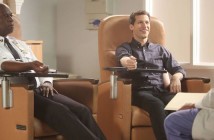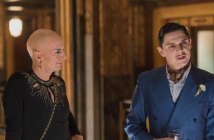November 6, 2014, 9:00 p.m. (EST), Fox
I’m not the right person to be reviewing Gracepoint. Sometimes, I recognize a fact like this before I take on a show. Sometimes, it takes me a little while to realize I’m not the right fit for one reason or another. When I decided to review the show, it was because I was legitimately interested in what it would look like, and I had hopes it would be something interesting. Yet six weeks into a ten week run, I find myself inexorably drawn to a textual comparison between this show and Broadchurch, a comparison in which the deck may just be stacked, for me. I imagine there is someone out there watching this who likes it better than Broadchurch (if you’re that someone, I would love to hear why), but that someone is not me. As I engage in the comparative analysis I promised I would attempt when this series began, Gracepoint constantly comes up wanting. Whether it’s the show, me, or some combination of the two, I can’t tell you. But after last week almost worked for me, “Episode Six” is a monumental letdown, nothing but a carbon copy of the show that came before this.
What happens to Jack in this episode is tragic, and Nick Nolte is very good in portraying his shattered dignity and his now revealed wounds that just won’t heal. The scene in which Mark confronts Jack is a showcase for both Nolte and Michael Pena, one a raw, exposed wire, the other a restrained and level-headed interrogator. It’s a great scene that cannot fully register for me because I’ve seen David Bradley play Nolte’s role so well. The problem with Nick Nolte in the same position is that Nolte registers an inherent gravitas that Bradley does not. Nolte’s weathered old sea captain is a figure stepped out of archetype, something that usually suits the actor very well. Compared to Dsvid Bradley’s small, quiet work, though, Nolte’s heartrending tale feels more contrived and less lived in; his suicide feels less tragically inevitable and more the endgame of a clever writer’s gamut. This isn’t really the fault of the actor nor the writers; it’s a fault that comes from having another, superior version of these same scenes sitting out there, waiting for me to rewatch.
That Gracepoint constantly makes me think of Gus Van Sant’s Psycho does it no favors. It is ostensibly a shot for shot remake (to date, anyway) that somehow misses the soul of the thing entirely. I liked Broadchurch very much, but I am not prepared to christen it a classic on the level of Psycho by any stretch of the imagination. And yet it feels wrong, somehow, to approach this facsimile as if it was a bona fide original, or even as if it was a piece of art worthy of standing on its own. The real problem Gracepoint runs into isn’t that it wasn’t necessary; few remakes are ever actually needed or even desired in an artistic sense (the only example I can think of off the top of my head of a vital remake is David Cronenberg’s The Fly). It is that the show has failed, utterly, to stand on its own merits. This could have been a good show even if it chose to do a close remake of the original if it had figured out a way, any way, to set itself apart. But Gracepoint is clearly meant for an audience who has never heard of Broadchurch. And that’s why I am wrong for this particular task. I’m not the audience for this show. I’m not the person this is for. I’m not just outside the target audience, I am excluded entirely from the calculations that went into this show.
Entering into the show, I was cynical about the motivations that went into the making of Gracepoint, but watching the thing has made me even more cynical, because there is an utter lack of vision here. Watching Gracepoint is akin to living in Plato’s cave—all I can see are shadows of a greater form just beyond my immediate vision. Stepping into the light won’t set me free, in this case though. It will just make the shadows disappear. Again, Gracepoint makes me talk of Broadchurch, a show I would call “very good, but flawed” in the sort of hushed tones that I am here. It makes me reference a show I liked in terms of cinematic classics and philosophical totems that even the original cannot measure up to. It makes me reach higher to pan better, to over-praise the original if only to further discredit the remake. Gracepoint is not a very good television program, but it might just be an adequate one if you aren’t viewing it as a second hand rehash of a product that worked well enough in its original incarnation.
There are four episodes of Gracepoint left. I’ll watch them because I agreed to watch them and that means something to me. I’ll watch them in hopes that when the show does deviate, as its promised to, it does interesting things. I’ll watch them because I don’t want to be a cynic, even if it is an easy default for me. But at the moment, Gracepoint is a bad assassin: mercenary, but only in a half-assed sort of way. It’s a show that has never bothered to move out of the shadow of its predecessor, perhaps because its afraid of what we would see if we glimpsed it in full light.
The Roundup
- “Did you ever see that girl again?” “See her? I married her.”
- “What would you know about being a man, Vince?”
Gracepoint is a bad assassin: mercenary, but only in a half-assed sort of way.
-
MEDIOCRE




